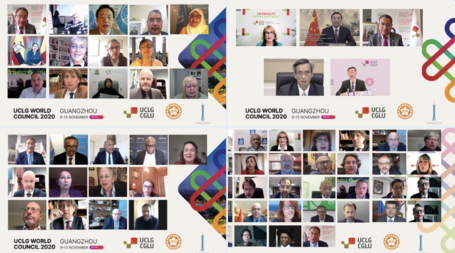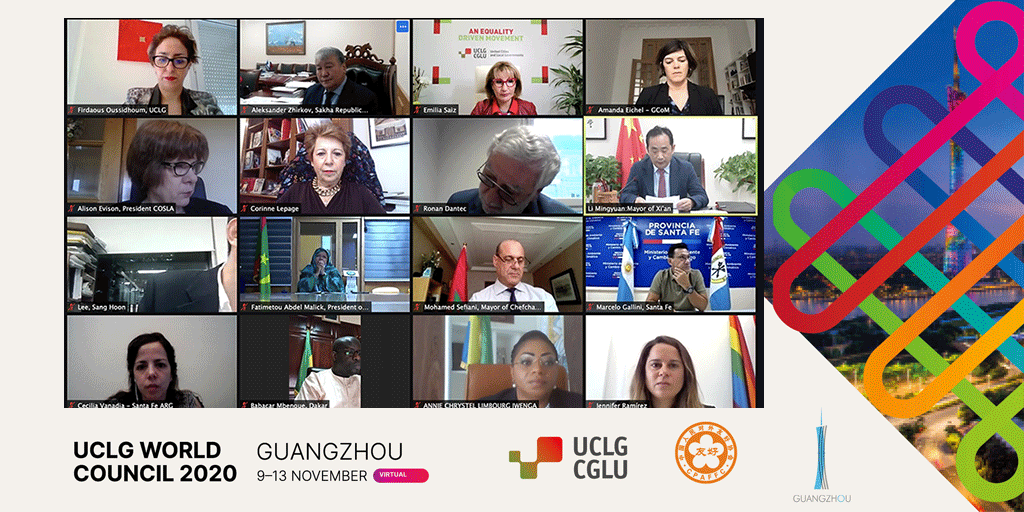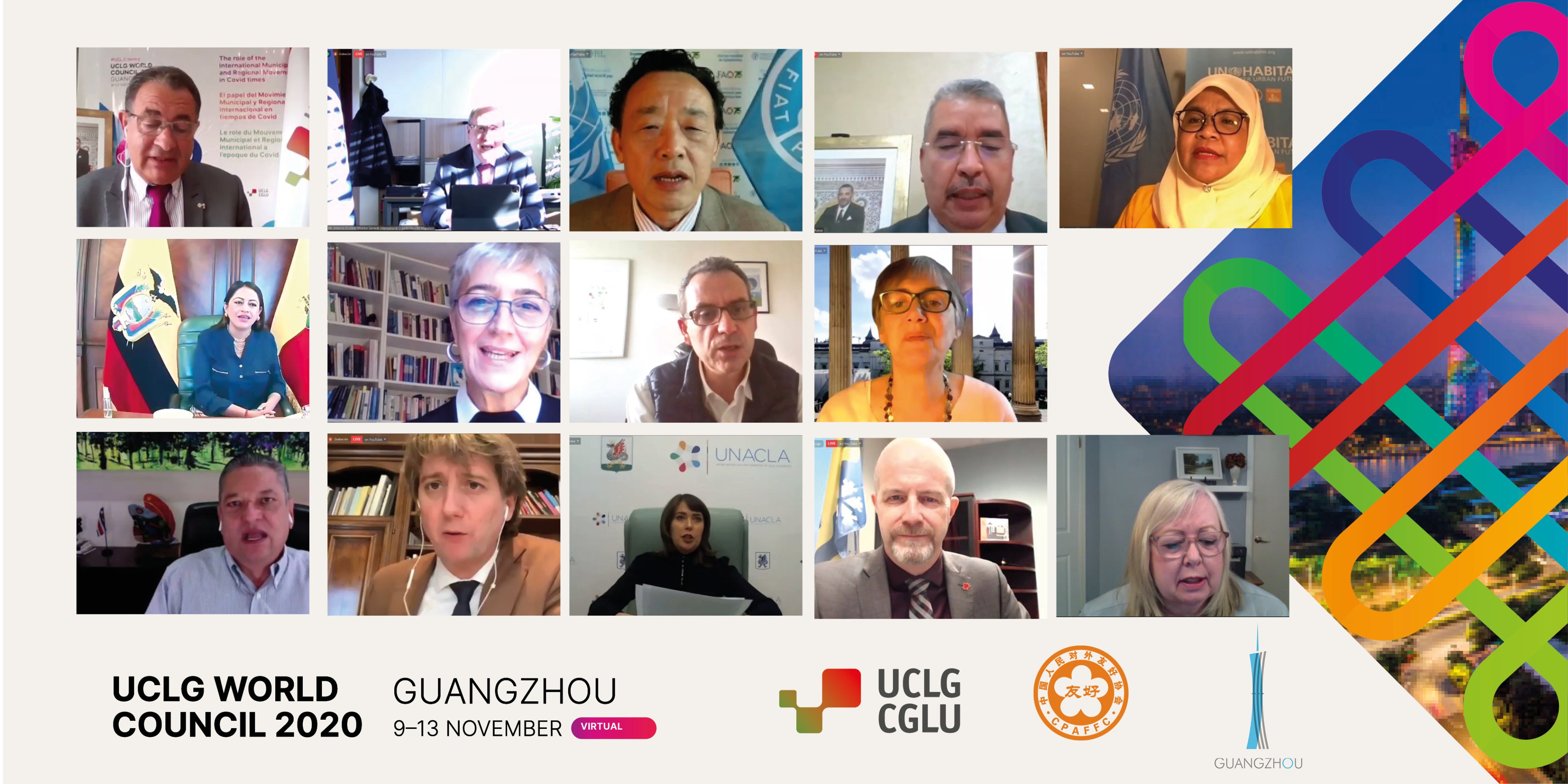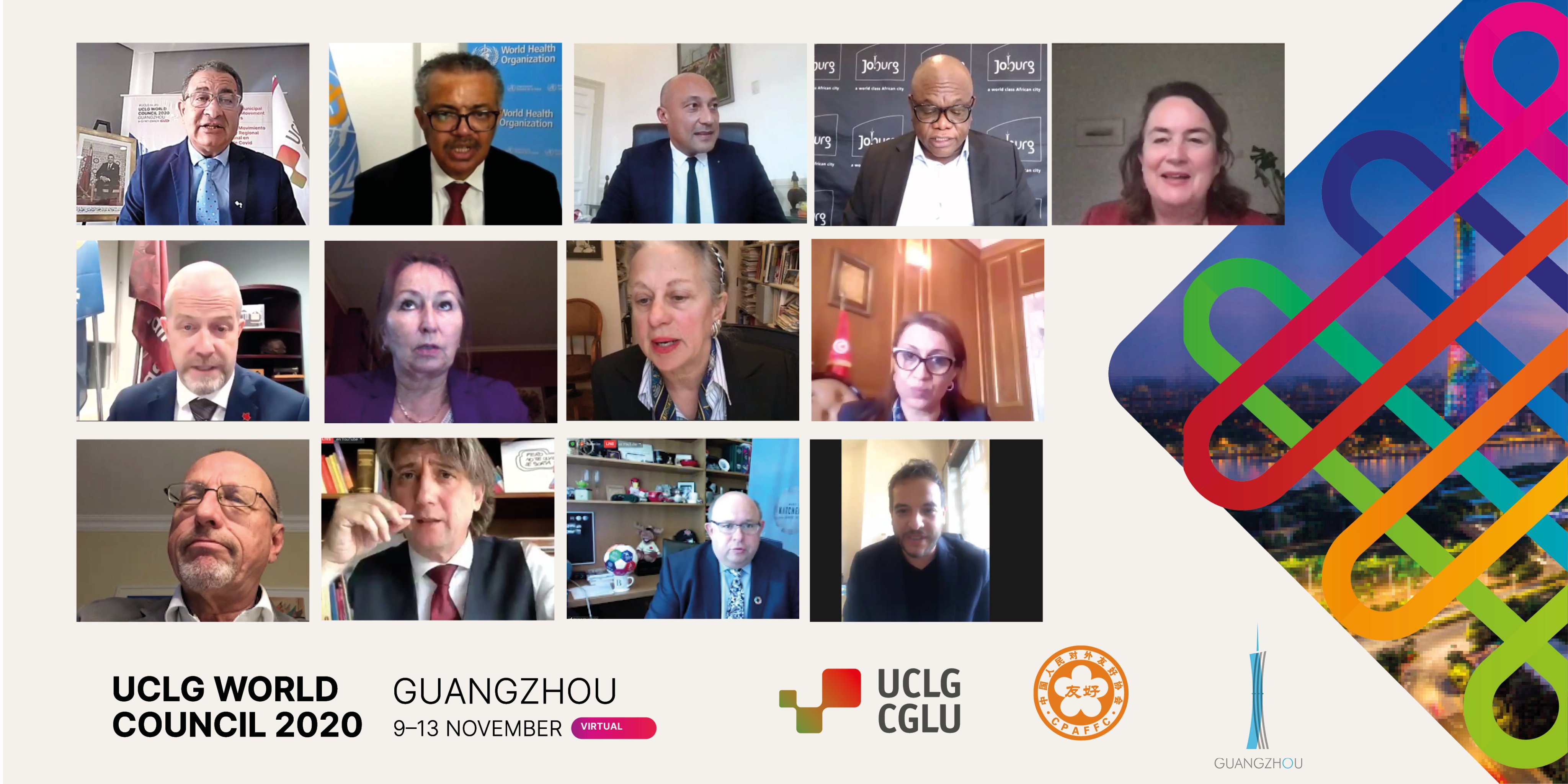
During the UCLG World Council, mayors and partners addressed some of the key policy issues for the future of humanity as we enter the Decade of Action in three High-Level debates. The Ecological Transition, Addressing Inequalities, and Leading the way to the Recovery are strategic areas that are reflected in both the work plan of our World Organization for the coming year as well as in the renewal of our strategic documents and the development of our policy, research, and learning tools. These are the red thread that will inspire our action, feed our work plan and ensure we remain relevant for the members and the communities that need us.
The necessary ecological transition for a post-COVID era that is in line with our natural environments
 The High-Level Policy Dialogue on Ecological Transition was introduced by Li Mingyuan, Mayor of Xi’an and Copresident of UCLG, and laid out the necessary links between democratic processes and carrying out the ecological transition. Mayors and representatives from local and regional governments and their networks addressed the catalyst role that they can play in ensuring an approach to the recovery that is nature-based, considers our relationship with nature as integral for the future, and builds on the SDGS.
The High-Level Policy Dialogue on Ecological Transition was introduced by Li Mingyuan, Mayor of Xi’an and Copresident of UCLG, and laid out the necessary links between democratic processes and carrying out the ecological transition. Mayors and representatives from local and regional governments and their networks addressed the catalyst role that they can play in ensuring an approach to the recovery that is nature-based, considers our relationship with nature as integral for the future, and builds on the SDGS.
Throughout the dialogue, participants made clear that our economies and territories are not yet resilient and empowered enough to respond to the pandemic, but also that it is local and regional governments who have taken the lead to pursue climate action and led the way to a more resilient recovery. It is time, to transform the relationship that human beings have with their surroundings and natural ecosystems, to ensure that our patterns of consumption and production are in line with the wellbeing of our populations, and to adopt local actions and strategies that can contribute to build local resilience. The debate also highlighted the need to raise ambitions to achieve the climate goals,
The session, which boasted over 170 participants, was moderated by Ronan Dantec, Senator of Loire-Atlantique, and UCLG Secretary General Emilia Saiz. The session gathered among its speakers former French Minister for the Ecological Transition Corinne Lepage, who presented the Declaration of Humankind Rights, the mayor of Izmir Tunç Soyer, the President of the Nouakchott Regional Council Fatimetou Abdel Malick, and mayor of Chefchaouen Mohamed Sefiani, as well as Alison Evison, president of COSLA, Mónica González, a member of the European Parliament, the Mayor in Charge of International Relations of Dakar, representatives from Seoul, the Province of Santa Fe, and Terrassa, and representatives from the members and partners of the Global Taskforce like Gino Van Begin, Secretary-General of ICLEI, Amanda Eichel, the Executive Director of GCoM, and the Secretaries General of CEMR Fréderic Vallier and UCLG-MEWA Mehmet Duman.
Local leadership and partnerships to bring about the pathways to equality
Our existing inequalities, as participants pointed out, are not new, but have been exacerbated by the pandemic, and have revealed the fragility of our responses to worldwide shocks. The Policy Debate on Addressing Inequalities, key in the COVID era, introduced the upcoming GOLD VI Report which will have the pathways to equalities as its flag. Participants highlighted that local and regional governments need to be the points of departure for the recovery, and the need for a new pact that places public service delivery and the commons at the core, ensuring that everyone can have equal access to healthcare, security, public spaces, and the many basic services that lead to a decent life.
 Director General of the IOM Antonio Vitorino, Qu Dongyu, Director General of the Food and Agriculture Organization (FAO), and Maimunah Mohd Sharif, Executive Director of UN-Habitat framed the debate. Representatives from Academia Caren Levy, Bartlett Development Planning Unit, University College of London and from the Civil Society Adriana Allen, President of the Habitat International Coalition, framed the importance of developing new pathways to address the inequalities through multi-sectoral partnerships.
Director General of the IOM Antonio Vitorino, Qu Dongyu, Director General of the Food and Agriculture Organization (FAO), and Maimunah Mohd Sharif, Executive Director of UN-Habitat framed the debate. Representatives from Academia Caren Levy, Bartlett Development Planning Unit, University College of London and from the Civil Society Adriana Allen, President of the Habitat International Coalition, framed the importance of developing new pathways to address the inequalities through multi-sectoral partnerships.
The representatives from local and regional governments were Mayor of Rabat, Mohamed Sadiki, Prefect of Pichincha Paola Pabón, Philippe Rio, Mayor of Grigny, Johnny Araya, Mayor of San José, Copresident of UCLG, Carlos Martínez, Mayor of Soria, Envoy of the UCLG Presidency on the New Urban Agenda, Evgeniya Lodvigova, Vice-Mayor of Kazan, and Garth Frizzell, President of the Federation of Canadian Municipalities (FCM), and they provided their views on the necessary steps to take to leave no-one behind, bringing the perspectives of local leadership and the role that local and regional governments can play as key actors in the transformation of the multilateral system in a way that can respond to the needs of their communities.
The necessary steps for a locally-driven recovery
The current pandemic has reinforced the importance of our role in raising public awareness, and in maintaining the functionality and provision of public services. The question is, once local and regional governments have proven their importance in the immediate aftermath: how can we ensure that the recovery reaches those that need it the most?
The debate was framed by Olivier De Schutter, UN Special Rapporteur on Extreme Poverty and Human Rights and Dr Tedros Adhanom Ghebreyesus, Director-General of the World Health Organization, in a conversation that aimed at setting the groundwork for delivering the Pact for the Future that will be the guide of the municipal movement in the coming years.
 The Policy Debate on Leading the way to the Recovery addressed how, indeed, the most vulnerable are the key priority for the recovery, and this is why the conversations on the recovery need to include the sustainability of service delivery ecosystems to ensure that no-one is left behind. Participants highlighted, as well, the importance of including local and regional governments in the conversations on financial recovery packages to ensure they reach the communities that need them the most and, indeed, to contribute to define what is and is not considered “essential” for the post-COVID 19 era, in dialogue with our communities and local stakeholders.
The Policy Debate on Leading the way to the Recovery addressed how, indeed, the most vulnerable are the key priority for the recovery, and this is why the conversations on the recovery need to include the sustainability of service delivery ecosystems to ensure that no-one is left behind. Participants highlighted, as well, the importance of including local and regional governments in the conversations on financial recovery packages to ensure they reach the communities that need them the most and, indeed, to contribute to define what is and is not considered “essential” for the post-COVID 19 era, in dialogue with our communities and local stakeholders.
Barbara Samuels, Executive Director of the Global Clearinghouse for Development Finance and newly appointed UCLG UBUNTU advisor, Geoff Makhubo, Mayor of Johannesburg, Garth Frizzell, President of FCM, Ellen van Selm, Mayor of Opsterland, Member of the Board of the Association of Netherlands Municipalities (VNG), Gunn Marit Hegelsen, First Deputy President of the Norwegian Association of Local and Regional Authorities (KS) and Co-President of the Council of European Municipalities and Regions (CEMR), and Arnaud Ngatcha, Deputy Mayor of Paris set out the initiatives of mayors during the pandemic, and the measures needed to leave no-one behind in the aftermath. Souad Abderrahim, Mayor of Tunis, Roland Schäffer, Mayor of Bergkamen, and Carlos Martínez, Mayor of Soria, Envoy of the UCLG Presidency on the Urban Agenda, Berry Vrbanovic, Mayor of Kitchener and Treasurer of UCLG, Christian di Candia, Mayor of Montevideo were the representatives that took part in the discussion, aiming to give shape to the “better normal” after he pandemic.
-
Read the full coverage of our World Council again here!










